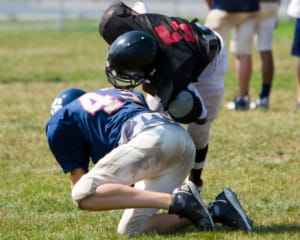Back pain in young athletes a rising problem

“Lower back injuries themselves are dangerous, but what is particularly troubling is what these injuries can mean for athletes later in life,” explains Matthew Budway, MD, a neurosurgeon with Bryn Mawr and Paoli hospitals who is based at the Main Line Health Newtown Square. “Without the right treatment and enough time to heal, back pain can mean long-term back problems.”
This low back pain that athletes experience can come from a number of different causes: too much intense training, stretching too far during warm-ups or a game, lifting too much weight, and being hit in the back are all contributing factors. These seemingly innocent injuries can snowball into something greater: torn muscles and broken bones.
While any athlete is at risk for a lower back injury, they seem to be more common in athletes who specialize in one sport; think competitive gymnasts or aspiring college football players.
“Often, athletes who are especially committed to their sport and to succeeding will push their physical limits, which ultimately puts their body at risk instead of benefiting them,” explains Dr. Budway.
Reduce your risk
Fortunately, there are steps you can take to reduce the risk of back injuries in young athletes:
- Take one day off for pain in the lower back, elbow, or shoulder. If the pain persists, take one week off. If the pain lasts longer than two weeks, make an appointment with a physician.
- Don’t specialize in one sport before adolescence. Encourage children to try a variety of different sports to increase overworking one muscle group.
- Take a break from sports during the year. Have at least one season off to allow your body to recover.
- Take at least one day off each week from exercising, conditioning, or playing a sport.
- Talk to coaches or trainers about exercises that stretch and strengthen your back, neck, and shoulders.
The most important tip in preventing back pain is recognizing it and allowing time for any necessary treatment, says Dr. Budway.
“If an athlete does suffer a lower back injury, it’s important to treat it as seriously as you would a concussion. It could take a few weeks or a few months, but you’ll be preventing injury later on. Make sure you’re medically cleared before returning to games or practice,” he explains.
If your son or daughter complains of back pain, numbness, or tingling, make an appointment with your physician, who can refer you to an orthopaedic specialist. To find a physician in your area or to make an appointment, call 1.866.CALL.MLH (1.866.225.5654). Want to learn more about back pain? Register for an upcoming back pain seminar.
 Content you want, delivered to your inbox
Content you want, delivered to your inbox
Want to get the latest health and wellness articles delivered right to your inbox?
Subscribe to the Well Ahead Newsletter.
